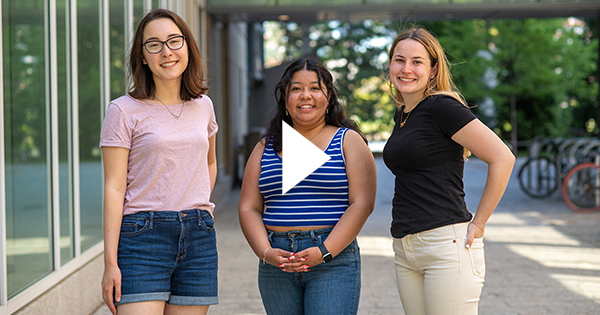Two days after Russia invaded, Kijas, the music librarian at Tufts College, put out a name for a “knowledge rescue session.” She already deliberate on attending a March 5 digital convention for digital humanists and noticed a chance to assist Ukrainians.
Kijas puzzled what she might do as a librarian accustomed to digital instruments. She had an inventory of particular libraries and archives in Ukraine with distinctive music collections. She determined that she might assist discover this stuff and digitally archive the online pages.
Kijas’ tweet caught the eye of Dombrowski and her colleague Majstorovic. The 2 approached Kijas with an concept: What in the event that they rescued extra than simply the music collections — and did it at a quicker tempo?
Initially, the staff deliberate to make use of the Web Archive’s Wayback Machine to save lots of info, however the Wayback Machine has a “superficial crawling of internet pages,” Kijas mentioned. The machine can solely save the primary or second layer of an internet site. Extra difficult options, similar to interactive options and scripted code, could be misplaced.
To counteract this downside, Majstorovic proposed that the staff use Webrecorder, an open-source software that may go seven or eight layers deep into an internet site and seize among the extra advanced media. The open-source nature of the software additionally meant that volunteers might straight edit the code and modify the software to their particular wants.
“From there, as soon as we began selling our challenge and getting tons and plenty of volunteers to hitch, individuals began to additionally take into consideration, ‘Okay, what different instruments can we use?’” Kijas mentioned. “We additionally haven’t any price range, proper? So we’re simply doing this as volunteers, and everybody who’s serving to is a volunteer.”
Browsertrix Crawler is one other software that’s in style among the many volunteers and is especially good for capturing web sites which have extra superior options similar to 3D excursions and calendars. Carrie Pirmann, a librarian at Bucknell College, who described herself as “fairly techie,” arrange the software on each her residence and work laptop in early March. In her workplace, she’s going to ceaselessly run the crawler on her laptop within the background as she works on different duties — she has since crawled over 300 web sites.
“That is sort of the place my library and sleuthing abilities actually have come into play,” Pirmann mentioned. “I don’t converse Ukrainian. I don’t learn Cyrillic.”
Pirmann can be a part of the situation-monitoring staff, the place she makes use of Google Maps and library directories to establish any heritage web sites which will want archiving. Considered one of Pirmann’s favourite web sites she’s archived is the general public library for a small city in Ukraine referred to as Bohodukiv — which shares a sister-city relationship with Pirmann’s hometown Boyerton, Pa.
“I’ve form of began calling them digital scrapbooks,” Pirmann mentioned, explaining that these libraries not solely have details about their library and ebook collections, however in depth photograph albums from occasions to youngsters’s programming. Pirmann hopes to in the future return this web site to the library.
“Perhaps individuals can discover photos of their children. It might be one of many few locations the place in case your house or your home has been bombed and also you’ve misplaced every thing, you would possibly nonetheless have the ability to return into that archive finally and discover a image or two of your youngsters,” Pirmann mentioned.
Internet crawling shouldn’t be the one a part of the archiving course of. Producing metadata is one other essential half. Kim Martin, assistant professor of historical past and tradition and expertise research on the College of Guelph, works for the metadata staff. When an merchandise is uploaded to the Web Archive machine, it produces fundamental metadata similar to a title, an outline and a URL. Nevertheless, the metadata consists of extra than simply this info.
“So we would have liked not identical to the URL for a JPEG picture, however we would have liked to point out what web page that was linked off of, we would have liked to provide it context,” Martin defined. The staff now has 16 metadata fields that they often fill out, making acutely aware choices about whether or not to fill out metadata fields in English, Ukrainian or Russian.
“We’re all studying from one another and actually taking over duties and transferring ahead as a gaggle, which is fairly attention-grabbing, as a result of none of us knew one another [before],” Martin mentioned.
From Lewisburg, Pa. to Wien, Austria, SUCHO volunteers coordinate all of their work by way of a Slack channel. There may be by no means a uninteresting second within the Slack, with totally different channels starting from speedy response groups to channels only for sending memes.
“Somebody discovered a wild-west restaurant in Ukraine that had essentially the most whimsical description of cheese sticks as Sheriff snacks, and nearly like a micro-story within the menu description of cheese sticks,” Dombrowski recalled. It’s these small moments that assist maintain the SUCHO volunteers by way of their work.
